Analysis of Global Convergence in Accounting Standards and Challenges
VerifiedAdded on 2021/05/31
|12
|3202
|110
Report
AI Summary
This report delves into the global convergence of accounting standards, exploring the increasing need for a unified system to facilitate international business and comparability. It argues for the benefits of a single set of standards, highlighting how it can streamline operations, reduce costs, and enhance investor confidence. The report also critically outlines the challenges, including variations in existing standards, implementation costs, and the need for adequate training. Furthermore, it examines the feasibility of the International Accounting Standards Board (IASB) goals, considering institutional perspectives and potential impacts on market participants. The report concludes by assessing the practical implications and potential obstacles to achieving global accounting convergence.
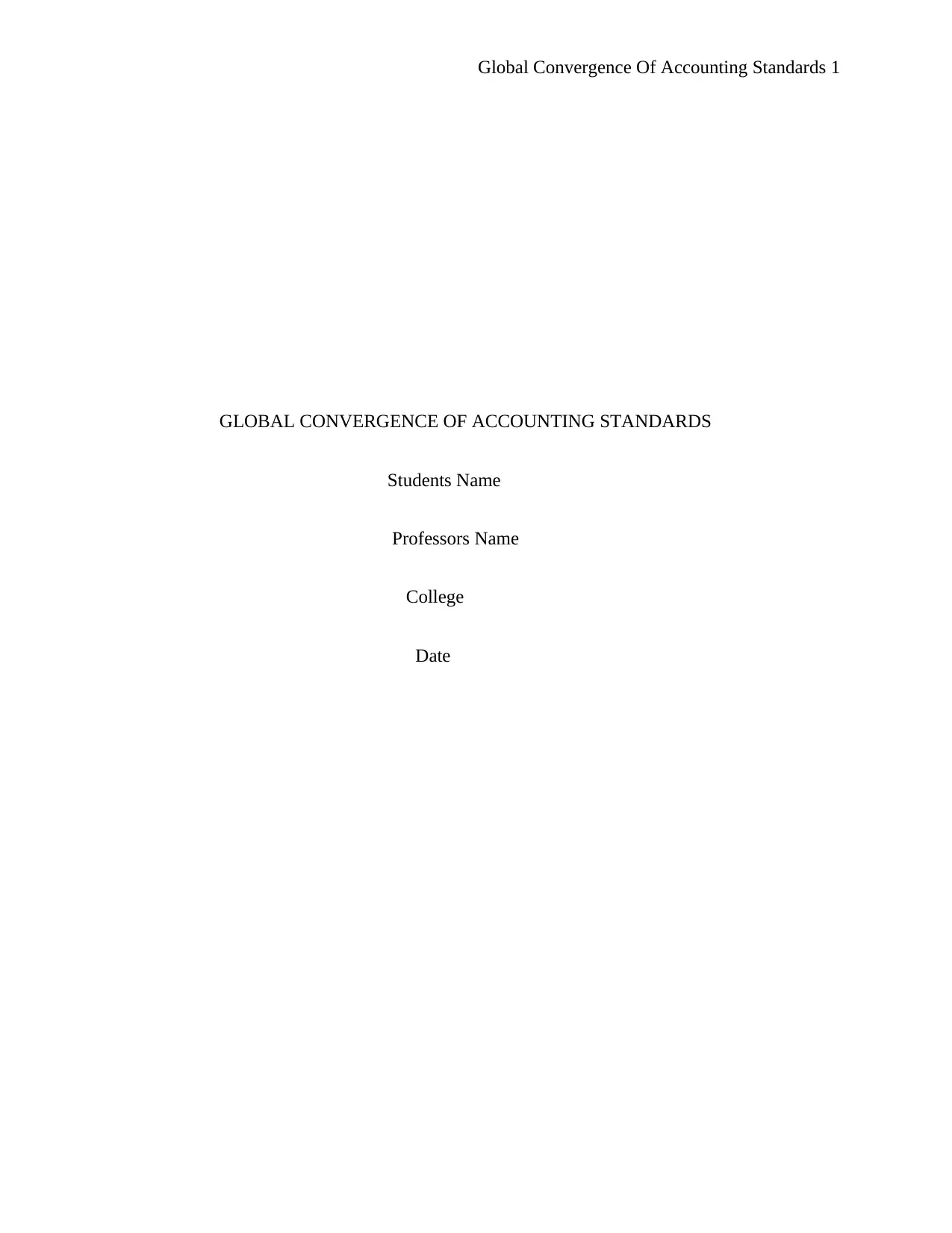
Global Convergence Of Accounting Standards 1
GLOBAL CONVERGENCE OF ACCOUNTING STANDARDS
Students Name
Professors Name
College
Date
GLOBAL CONVERGENCE OF ACCOUNTING STANDARDS
Students Name
Professors Name
College
Date
Paraphrase This Document
Need a fresh take? Get an instant paraphrase of this document with our AI Paraphraser
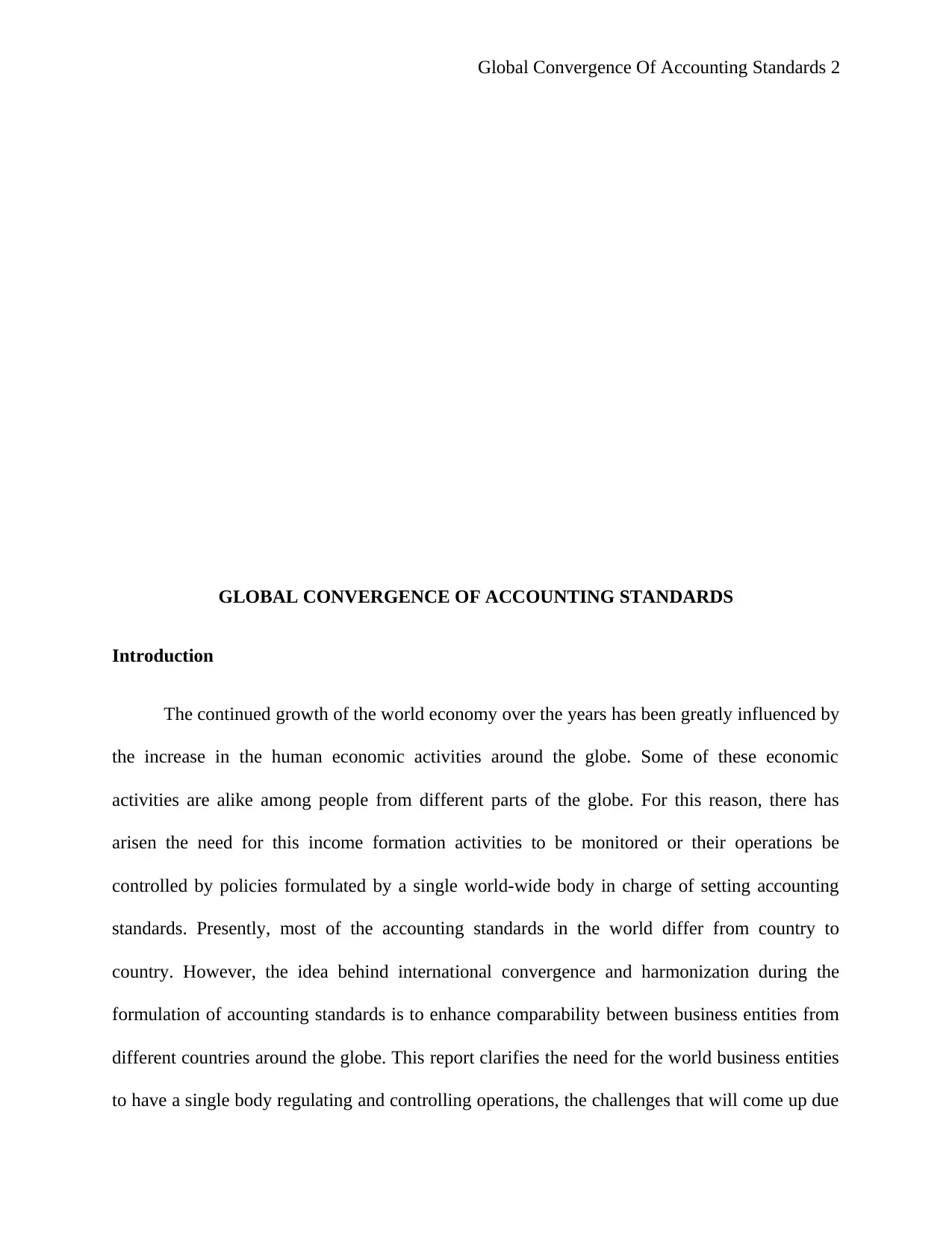
Global Convergence Of Accounting Standards 2
GLOBAL CONVERGENCE OF ACCOUNTING STANDARDS
Introduction
The continued growth of the world economy over the years has been greatly influenced by
the increase in the human economic activities around the globe. Some of these economic
activities are alike among people from different parts of the globe. For this reason, there has
arisen the need for this income formation activities to be monitored or their operations be
controlled by policies formulated by a single world-wide body in charge of setting accounting
standards. Presently, most of the accounting standards in the world differ from country to
country. However, the idea behind international convergence and harmonization during the
formulation of accounting standards is to enhance comparability between business entities from
different countries around the globe. This report clarifies the need for the world business entities
to have a single body regulating and controlling operations, the challenges that will come up due
GLOBAL CONVERGENCE OF ACCOUNTING STANDARDS
Introduction
The continued growth of the world economy over the years has been greatly influenced by
the increase in the human economic activities around the globe. Some of these economic
activities are alike among people from different parts of the globe. For this reason, there has
arisen the need for this income formation activities to be monitored or their operations be
controlled by policies formulated by a single world-wide body in charge of setting accounting
standards. Presently, most of the accounting standards in the world differ from country to
country. However, the idea behind international convergence and harmonization during the
formulation of accounting standards is to enhance comparability between business entities from
different countries around the globe. This report clarifies the need for the world business entities
to have a single body regulating and controlling operations, the challenges that will come up due
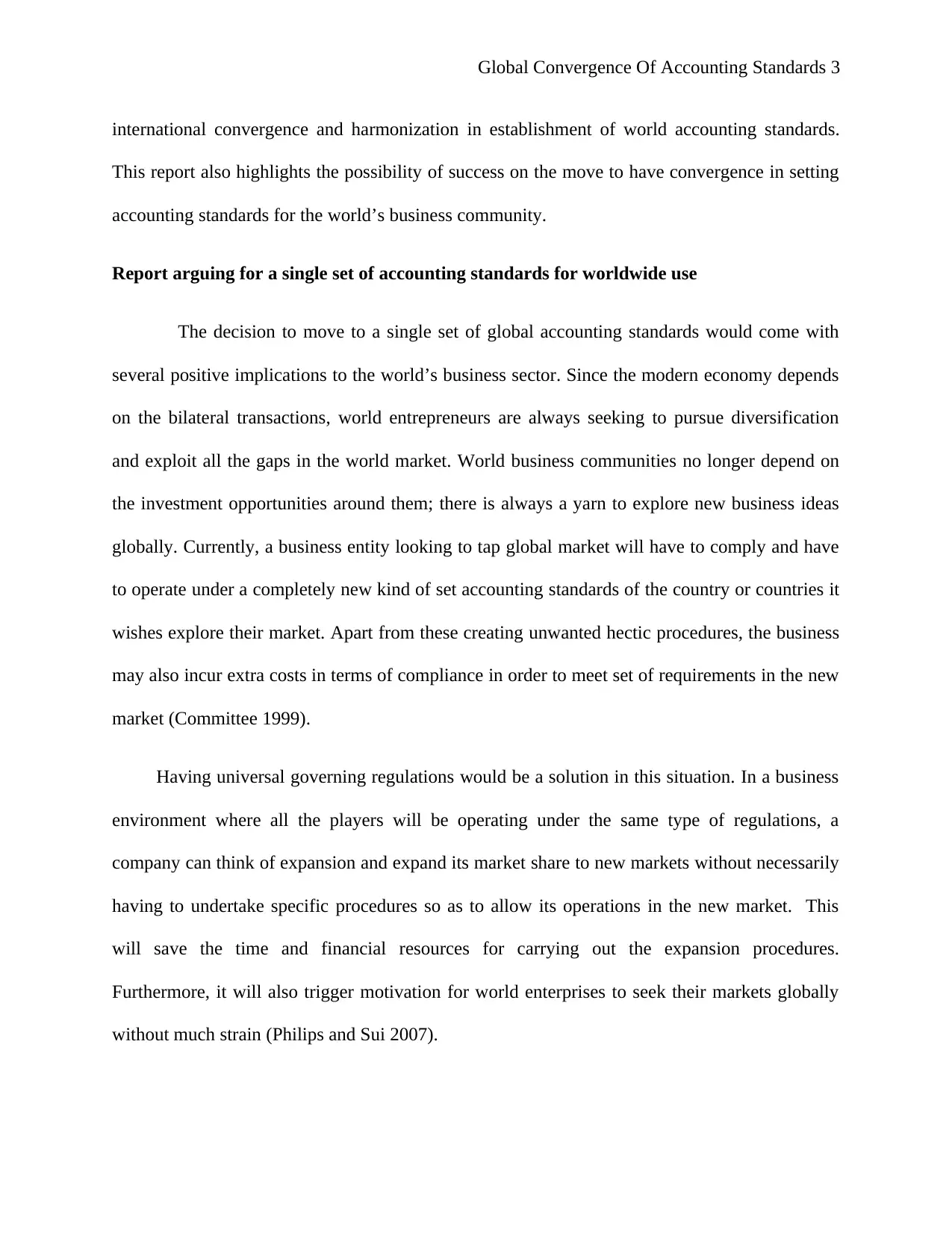
Global Convergence Of Accounting Standards 3
international convergence and harmonization in establishment of world accounting standards.
This report also highlights the possibility of success on the move to have convergence in setting
accounting standards for the world’s business community.
Report arguing for a single set of accounting standards for worldwide use
The decision to move to a single set of global accounting standards would come with
several positive implications to the world’s business sector. Since the modern economy depends
on the bilateral transactions, world entrepreneurs are always seeking to pursue diversification
and exploit all the gaps in the world market. World business communities no longer depend on
the investment opportunities around them; there is always a yarn to explore new business ideas
globally. Currently, a business entity looking to tap global market will have to comply and have
to operate under a completely new kind of set accounting standards of the country or countries it
wishes explore their market. Apart from these creating unwanted hectic procedures, the business
may also incur extra costs in terms of compliance in order to meet set of requirements in the new
market (Committee 1999).
Having universal governing regulations would be a solution in this situation. In a business
environment where all the players will be operating under the same type of regulations, a
company can think of expansion and expand its market share to new markets without necessarily
having to undertake specific procedures so as to allow its operations in the new market. This
will save the time and financial resources for carrying out the expansion procedures.
Furthermore, it will also trigger motivation for world enterprises to seek their markets globally
without much strain (Philips and Sui 2007).
international convergence and harmonization in establishment of world accounting standards.
This report also highlights the possibility of success on the move to have convergence in setting
accounting standards for the world’s business community.
Report arguing for a single set of accounting standards for worldwide use
The decision to move to a single set of global accounting standards would come with
several positive implications to the world’s business sector. Since the modern economy depends
on the bilateral transactions, world entrepreneurs are always seeking to pursue diversification
and exploit all the gaps in the world market. World business communities no longer depend on
the investment opportunities around them; there is always a yarn to explore new business ideas
globally. Currently, a business entity looking to tap global market will have to comply and have
to operate under a completely new kind of set accounting standards of the country or countries it
wishes explore their market. Apart from these creating unwanted hectic procedures, the business
may also incur extra costs in terms of compliance in order to meet set of requirements in the new
market (Committee 1999).
Having universal governing regulations would be a solution in this situation. In a business
environment where all the players will be operating under the same type of regulations, a
company can think of expansion and expand its market share to new markets without necessarily
having to undertake specific procedures so as to allow its operations in the new market. This
will save the time and financial resources for carrying out the expansion procedures.
Furthermore, it will also trigger motivation for world enterprises to seek their markets globally
without much strain (Philips and Sui 2007).
⊘ This is a preview!⊘
Do you want full access?
Subscribe today to unlock all pages.

Trusted by 1+ million students worldwide
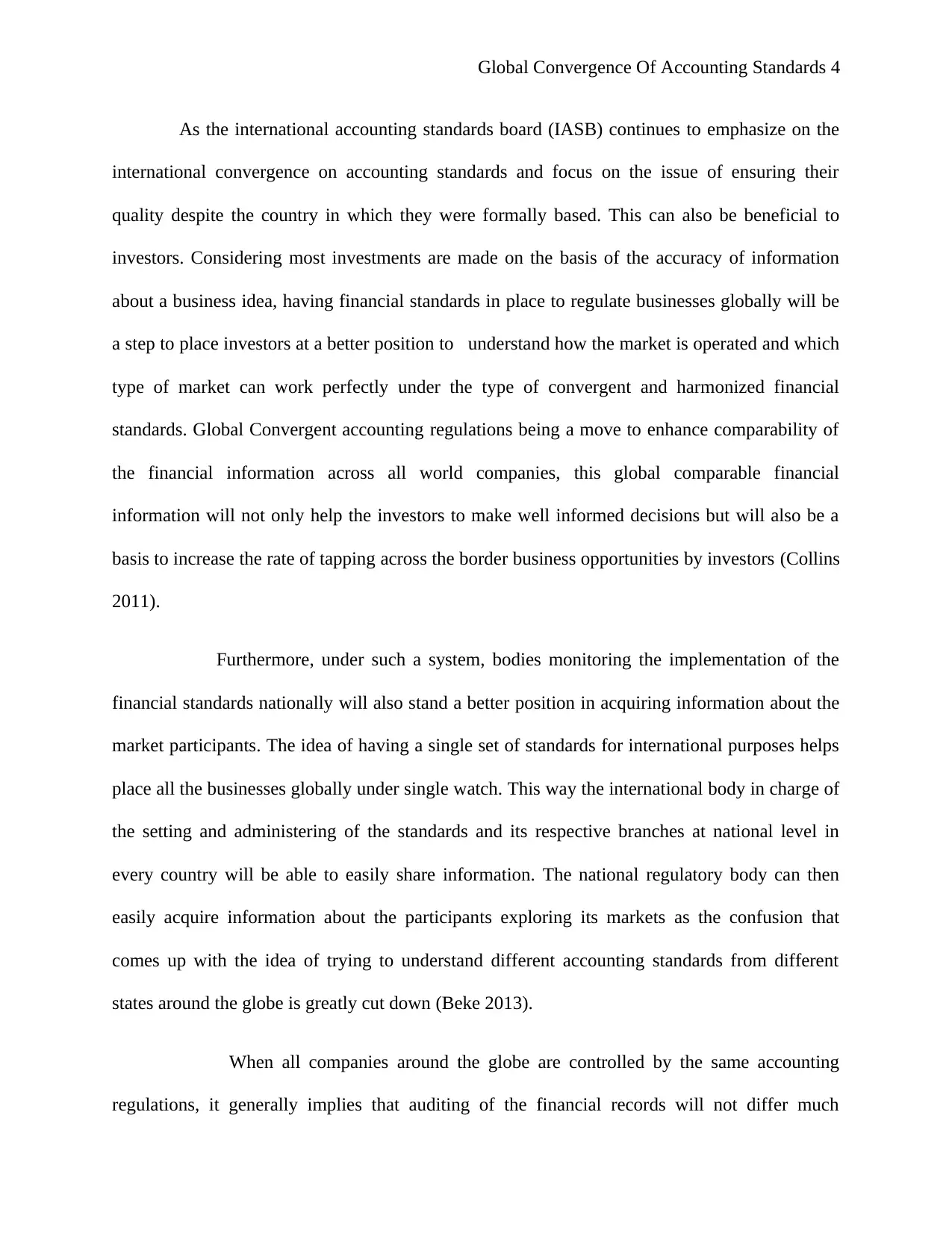
Global Convergence Of Accounting Standards 4
As the international accounting standards board (IASB) continues to emphasize on the
international convergence on accounting standards and focus on the issue of ensuring their
quality despite the country in which they were formally based. This can also be beneficial to
investors. Considering most investments are made on the basis of the accuracy of information
about a business idea, having financial standards in place to regulate businesses globally will be
a step to place investors at a better position to understand how the market is operated and which
type of market can work perfectly under the type of convergent and harmonized financial
standards. Global Convergent accounting regulations being a move to enhance comparability of
the financial information across all world companies, this global comparable financial
information will not only help the investors to make well informed decisions but will also be a
basis to increase the rate of tapping across the border business opportunities by investors (Collins
2011).
Furthermore, under such a system, bodies monitoring the implementation of the
financial standards nationally will also stand a better position in acquiring information about the
market participants. The idea of having a single set of standards for international purposes helps
place all the businesses globally under single watch. This way the international body in charge of
the setting and administering of the standards and its respective branches at national level in
every country will be able to easily share information. The national regulatory body can then
easily acquire information about the participants exploring its markets as the confusion that
comes up with the idea of trying to understand different accounting standards from different
states around the globe is greatly cut down (Beke 2013).
When all companies around the globe are controlled by the same accounting
regulations, it generally implies that auditing of the financial records will not differ much
As the international accounting standards board (IASB) continues to emphasize on the
international convergence on accounting standards and focus on the issue of ensuring their
quality despite the country in which they were formally based. This can also be beneficial to
investors. Considering most investments are made on the basis of the accuracy of information
about a business idea, having financial standards in place to regulate businesses globally will be
a step to place investors at a better position to understand how the market is operated and which
type of market can work perfectly under the type of convergent and harmonized financial
standards. Global Convergent accounting regulations being a move to enhance comparability of
the financial information across all world companies, this global comparable financial
information will not only help the investors to make well informed decisions but will also be a
basis to increase the rate of tapping across the border business opportunities by investors (Collins
2011).
Furthermore, under such a system, bodies monitoring the implementation of the
financial standards nationally will also stand a better position in acquiring information about the
market participants. The idea of having a single set of standards for international purposes helps
place all the businesses globally under single watch. This way the international body in charge of
the setting and administering of the standards and its respective branches at national level in
every country will be able to easily share information. The national regulatory body can then
easily acquire information about the participants exploring its markets as the confusion that
comes up with the idea of trying to understand different accounting standards from different
states around the globe is greatly cut down (Beke 2013).
When all companies around the globe are controlled by the same accounting
regulations, it generally implies that auditing of the financial records will not differ much
Paraphrase This Document
Need a fresh take? Get an instant paraphrase of this document with our AI Paraphraser
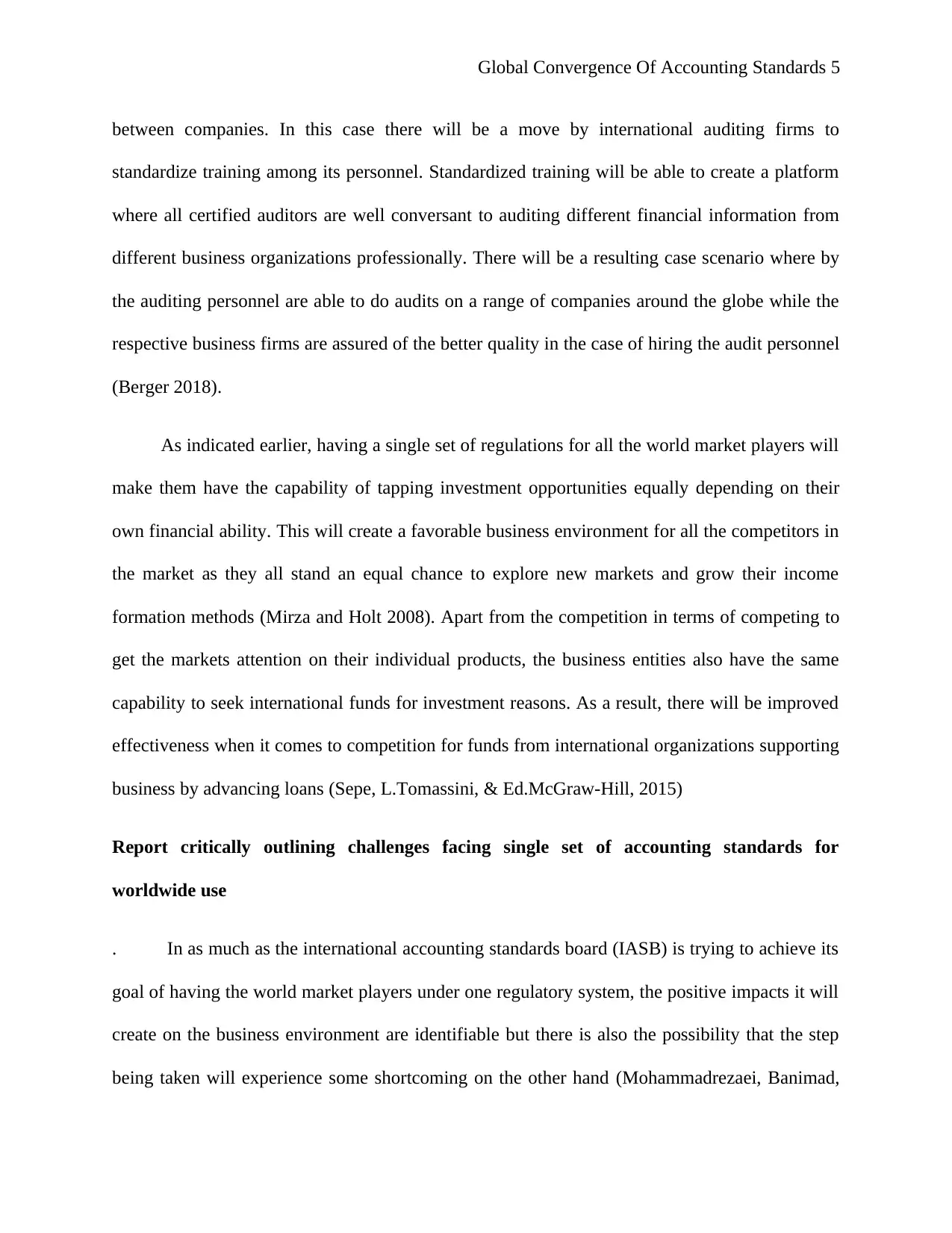
Global Convergence Of Accounting Standards 5
between companies. In this case there will be a move by international auditing firms to
standardize training among its personnel. Standardized training will be able to create a platform
where all certified auditors are well conversant to auditing different financial information from
different business organizations professionally. There will be a resulting case scenario where by
the auditing personnel are able to do audits on a range of companies around the globe while the
respective business firms are assured of the better quality in the case of hiring the audit personnel
(Berger 2018).
As indicated earlier, having a single set of regulations for all the world market players will
make them have the capability of tapping investment opportunities equally depending on their
own financial ability. This will create a favorable business environment for all the competitors in
the market as they all stand an equal chance to explore new markets and grow their income
formation methods (Mirza and Holt 2008). Apart from the competition in terms of competing to
get the markets attention on their individual products, the business entities also have the same
capability to seek international funds for investment reasons. As a result, there will be improved
effectiveness when it comes to competition for funds from international organizations supporting
business by advancing loans (Sepe, L.Tomassini, & Ed.McGraw-Hill, 2015)
Report critically outlining challenges facing single set of accounting standards for
worldwide use
. In as much as the international accounting standards board (IASB) is trying to achieve its
goal of having the world market players under one regulatory system, the positive impacts it will
create on the business environment are identifiable but there is also the possibility that the step
being taken will experience some shortcoming on the other hand (Mohammadrezaei, Banimad,
between companies. In this case there will be a move by international auditing firms to
standardize training among its personnel. Standardized training will be able to create a platform
where all certified auditors are well conversant to auditing different financial information from
different business organizations professionally. There will be a resulting case scenario where by
the auditing personnel are able to do audits on a range of companies around the globe while the
respective business firms are assured of the better quality in the case of hiring the audit personnel
(Berger 2018).
As indicated earlier, having a single set of regulations for all the world market players will
make them have the capability of tapping investment opportunities equally depending on their
own financial ability. This will create a favorable business environment for all the competitors in
the market as they all stand an equal chance to explore new markets and grow their income
formation methods (Mirza and Holt 2008). Apart from the competition in terms of competing to
get the markets attention on their individual products, the business entities also have the same
capability to seek international funds for investment reasons. As a result, there will be improved
effectiveness when it comes to competition for funds from international organizations supporting
business by advancing loans (Sepe, L.Tomassini, & Ed.McGraw-Hill, 2015)
Report critically outlining challenges facing single set of accounting standards for
worldwide use
. In as much as the international accounting standards board (IASB) is trying to achieve its
goal of having the world market players under one regulatory system, the positive impacts it will
create on the business environment are identifiable but there is also the possibility that the step
being taken will experience some shortcoming on the other hand (Mohammadrezaei, Banimad,
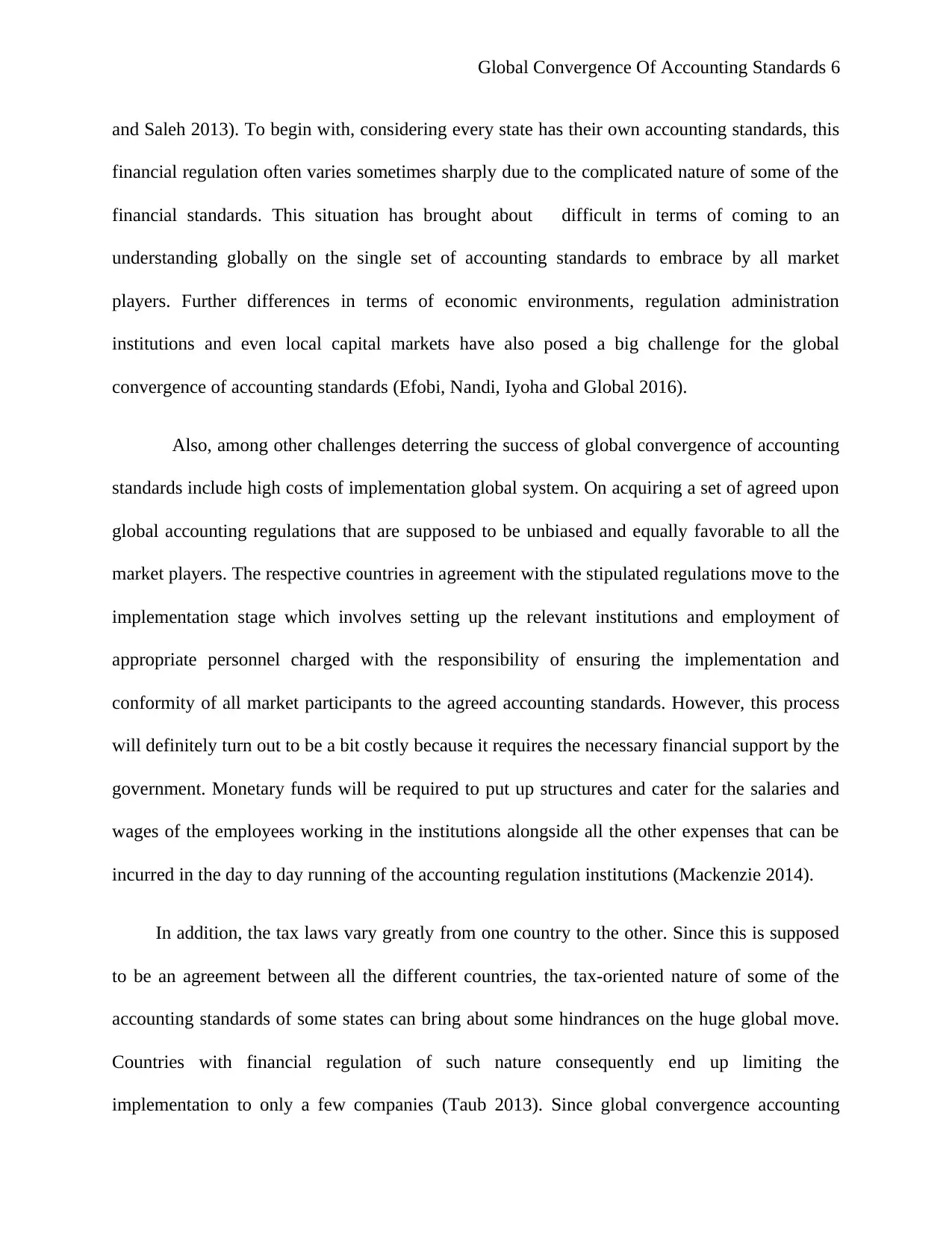
Global Convergence Of Accounting Standards 6
and Saleh 2013). To begin with, considering every state has their own accounting standards, this
financial regulation often varies sometimes sharply due to the complicated nature of some of the
financial standards. This situation has brought about difficult in terms of coming to an
understanding globally on the single set of accounting standards to embrace by all market
players. Further differences in terms of economic environments, regulation administration
institutions and even local capital markets have also posed a big challenge for the global
convergence of accounting standards (Efobi, Nandi, Iyoha and Global 2016).
Also, among other challenges deterring the success of global convergence of accounting
standards include high costs of implementation global system. On acquiring a set of agreed upon
global accounting regulations that are supposed to be unbiased and equally favorable to all the
market players. The respective countries in agreement with the stipulated regulations move to the
implementation stage which involves setting up the relevant institutions and employment of
appropriate personnel charged with the responsibility of ensuring the implementation and
conformity of all market participants to the agreed accounting standards. However, this process
will definitely turn out to be a bit costly because it requires the necessary financial support by the
government. Monetary funds will be required to put up structures and cater for the salaries and
wages of the employees working in the institutions alongside all the other expenses that can be
incurred in the day to day running of the accounting regulation institutions (Mackenzie 2014).
In addition, the tax laws vary greatly from one country to the other. Since this is supposed
to be an agreement between all the different countries, the tax-oriented nature of some of the
accounting standards of some states can bring about some hindrances on the huge global move.
Countries with financial regulation of such nature consequently end up limiting the
implementation to only a few companies (Taub 2013). Since global convergence accounting
and Saleh 2013). To begin with, considering every state has their own accounting standards, this
financial regulation often varies sometimes sharply due to the complicated nature of some of the
financial standards. This situation has brought about difficult in terms of coming to an
understanding globally on the single set of accounting standards to embrace by all market
players. Further differences in terms of economic environments, regulation administration
institutions and even local capital markets have also posed a big challenge for the global
convergence of accounting standards (Efobi, Nandi, Iyoha and Global 2016).
Also, among other challenges deterring the success of global convergence of accounting
standards include high costs of implementation global system. On acquiring a set of agreed upon
global accounting regulations that are supposed to be unbiased and equally favorable to all the
market players. The respective countries in agreement with the stipulated regulations move to the
implementation stage which involves setting up the relevant institutions and employment of
appropriate personnel charged with the responsibility of ensuring the implementation and
conformity of all market participants to the agreed accounting standards. However, this process
will definitely turn out to be a bit costly because it requires the necessary financial support by the
government. Monetary funds will be required to put up structures and cater for the salaries and
wages of the employees working in the institutions alongside all the other expenses that can be
incurred in the day to day running of the accounting regulation institutions (Mackenzie 2014).
In addition, the tax laws vary greatly from one country to the other. Since this is supposed
to be an agreement between all the different countries, the tax-oriented nature of some of the
accounting standards of some states can bring about some hindrances on the huge global move.
Countries with financial regulation of such nature consequently end up limiting the
implementation to only a few companies (Taub 2013). Since global convergence accounting
⊘ This is a preview!⊘
Do you want full access?
Subscribe today to unlock all pages.

Trusted by 1+ million students worldwide
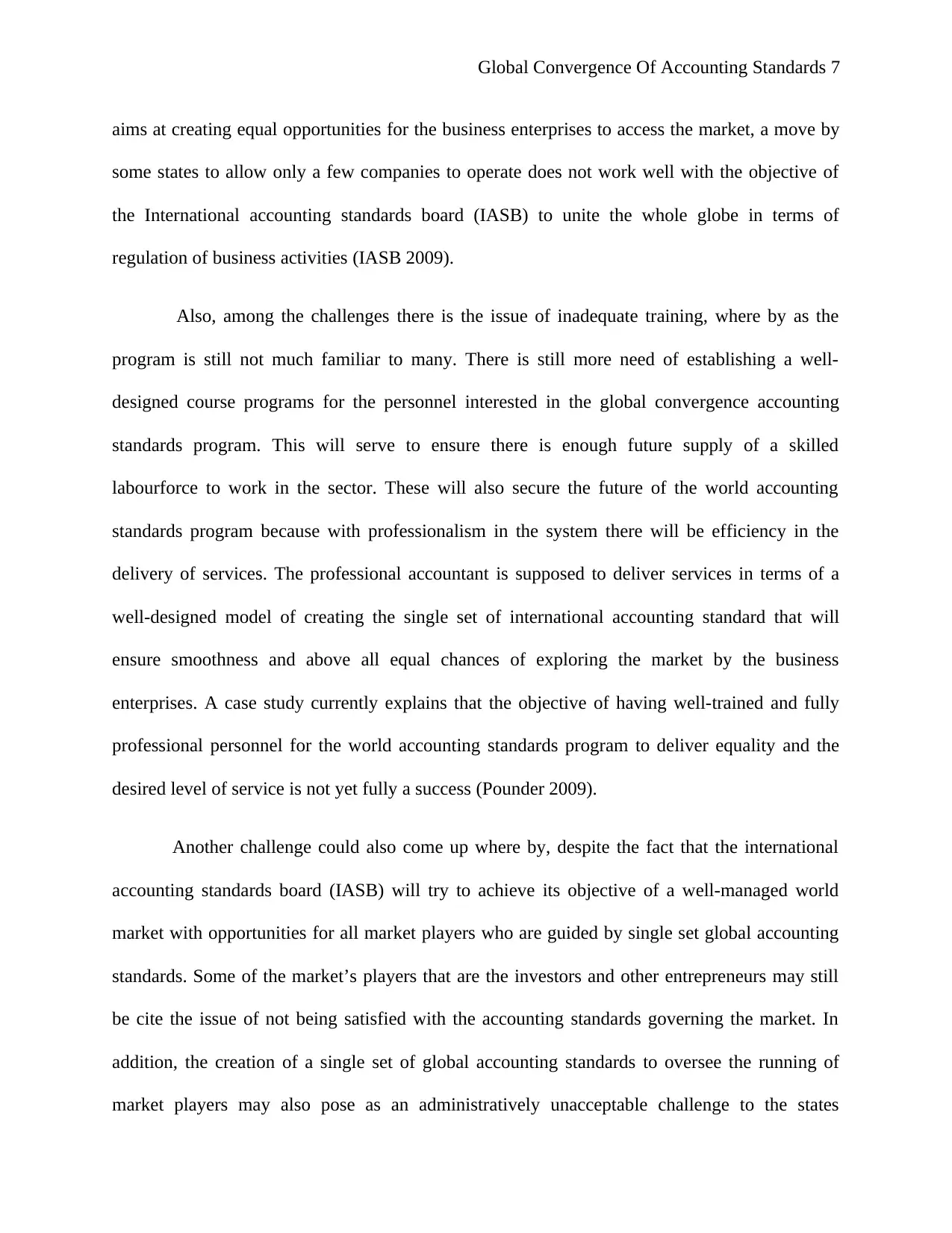
Global Convergence Of Accounting Standards 7
aims at creating equal opportunities for the business enterprises to access the market, a move by
some states to allow only a few companies to operate does not work well with the objective of
the International accounting standards board (IASB) to unite the whole globe in terms of
regulation of business activities (IASB 2009).
Also, among the challenges there is the issue of inadequate training, where by as the
program is still not much familiar to many. There is still more need of establishing a well-
designed course programs for the personnel interested in the global convergence accounting
standards program. This will serve to ensure there is enough future supply of a skilled
labourforce to work in the sector. These will also secure the future of the world accounting
standards program because with professionalism in the system there will be efficiency in the
delivery of services. The professional accountant is supposed to deliver services in terms of a
well-designed model of creating the single set of international accounting standard that will
ensure smoothness and above all equal chances of exploring the market by the business
enterprises. A case study currently explains that the objective of having well-trained and fully
professional personnel for the world accounting standards program to deliver equality and the
desired level of service is not yet fully a success (Pounder 2009).
Another challenge could also come up where by, despite the fact that the international
accounting standards board (IASB) will try to achieve its objective of a well-managed world
market with opportunities for all market players who are guided by single set global accounting
standards. Some of the market’s players that are the investors and other entrepreneurs may still
be cite the issue of not being satisfied with the accounting standards governing the market. In
addition, the creation of a single set of global accounting standards to oversee the running of
market players may also pose as an administratively unacceptable challenge to the states
aims at creating equal opportunities for the business enterprises to access the market, a move by
some states to allow only a few companies to operate does not work well with the objective of
the International accounting standards board (IASB) to unite the whole globe in terms of
regulation of business activities (IASB 2009).
Also, among the challenges there is the issue of inadequate training, where by as the
program is still not much familiar to many. There is still more need of establishing a well-
designed course programs for the personnel interested in the global convergence accounting
standards program. This will serve to ensure there is enough future supply of a skilled
labourforce to work in the sector. These will also secure the future of the world accounting
standards program because with professionalism in the system there will be efficiency in the
delivery of services. The professional accountant is supposed to deliver services in terms of a
well-designed model of creating the single set of international accounting standard that will
ensure smoothness and above all equal chances of exploring the market by the business
enterprises. A case study currently explains that the objective of having well-trained and fully
professional personnel for the world accounting standards program to deliver equality and the
desired level of service is not yet fully a success (Pounder 2009).
Another challenge could also come up where by, despite the fact that the international
accounting standards board (IASB) will try to achieve its objective of a well-managed world
market with opportunities for all market players who are guided by single set global accounting
standards. Some of the market’s players that are the investors and other entrepreneurs may still
be cite the issue of not being satisfied with the accounting standards governing the market. In
addition, the creation of a single set of global accounting standards to oversee the running of
market players may also pose as an administratively unacceptable challenge to the states
Paraphrase This Document
Need a fresh take? Get an instant paraphrase of this document with our AI Paraphraser
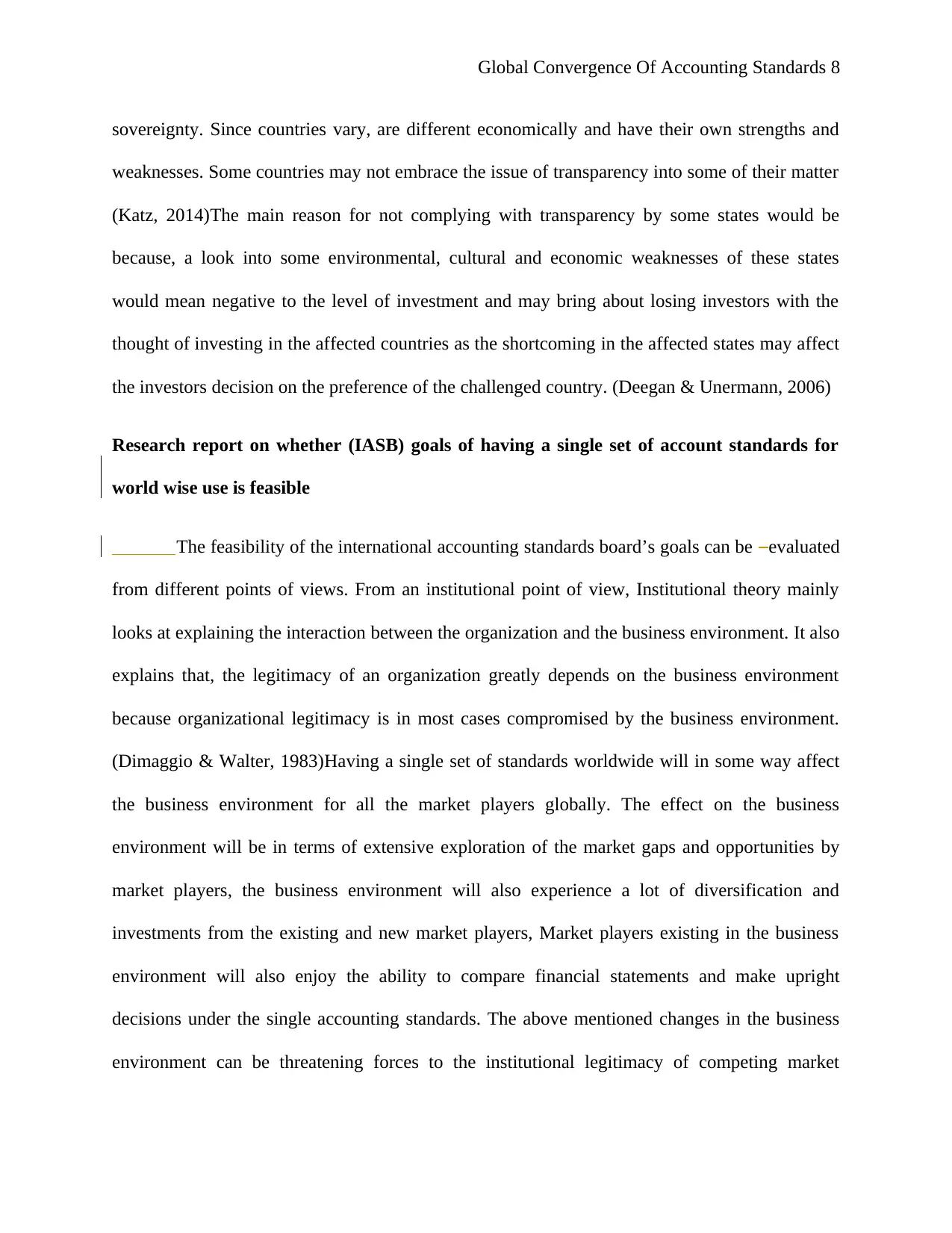
Global Convergence Of Accounting Standards 8
sovereignty. Since countries vary, are different economically and have their own strengths and
weaknesses. Some countries may not embrace the issue of transparency into some of their matter
(Katz, 2014)The main reason for not complying with transparency by some states would be
because, a look into some environmental, cultural and economic weaknesses of these states
would mean negative to the level of investment and may bring about losing investors with the
thought of investing in the affected countries as the shortcoming in the affected states may affect
the investors decision on the preference of the challenged country. (Deegan & Unermann, 2006)
Research report on whether (IASB) goals of having a single set of account standards for
world wise use is feasible
The feasibility of the international accounting standards board’s goals can be evaluated
from different points of views. From an institutional point of view, Institutional theory mainly
looks at explaining the interaction between the organization and the business environment. It also
explains that, the legitimacy of an organization greatly depends on the business environment
because organizational legitimacy is in most cases compromised by the business environment.
(Dimaggio & Walter, 1983)Having a single set of standards worldwide will in some way affect
the business environment for all the market players globally. The effect on the business
environment will be in terms of extensive exploration of the market gaps and opportunities by
market players, the business environment will also experience a lot of diversification and
investments from the existing and new market players, Market players existing in the business
environment will also enjoy the ability to compare financial statements and make upright
decisions under the single accounting standards. The above mentioned changes in the business
environment can be threatening forces to the institutional legitimacy of competing market
sovereignty. Since countries vary, are different economically and have their own strengths and
weaknesses. Some countries may not embrace the issue of transparency into some of their matter
(Katz, 2014)The main reason for not complying with transparency by some states would be
because, a look into some environmental, cultural and economic weaknesses of these states
would mean negative to the level of investment and may bring about losing investors with the
thought of investing in the affected countries as the shortcoming in the affected states may affect
the investors decision on the preference of the challenged country. (Deegan & Unermann, 2006)
Research report on whether (IASB) goals of having a single set of account standards for
world wise use is feasible
The feasibility of the international accounting standards board’s goals can be evaluated
from different points of views. From an institutional point of view, Institutional theory mainly
looks at explaining the interaction between the organization and the business environment. It also
explains that, the legitimacy of an organization greatly depends on the business environment
because organizational legitimacy is in most cases compromised by the business environment.
(Dimaggio & Walter, 1983)Having a single set of standards worldwide will in some way affect
the business environment for all the market players globally. The effect on the business
environment will be in terms of extensive exploration of the market gaps and opportunities by
market players, the business environment will also experience a lot of diversification and
investments from the existing and new market players, Market players existing in the business
environment will also enjoy the ability to compare financial statements and make upright
decisions under the single accounting standards. The above mentioned changes in the business
environment can be threatening forces to the institutional legitimacy of competing market
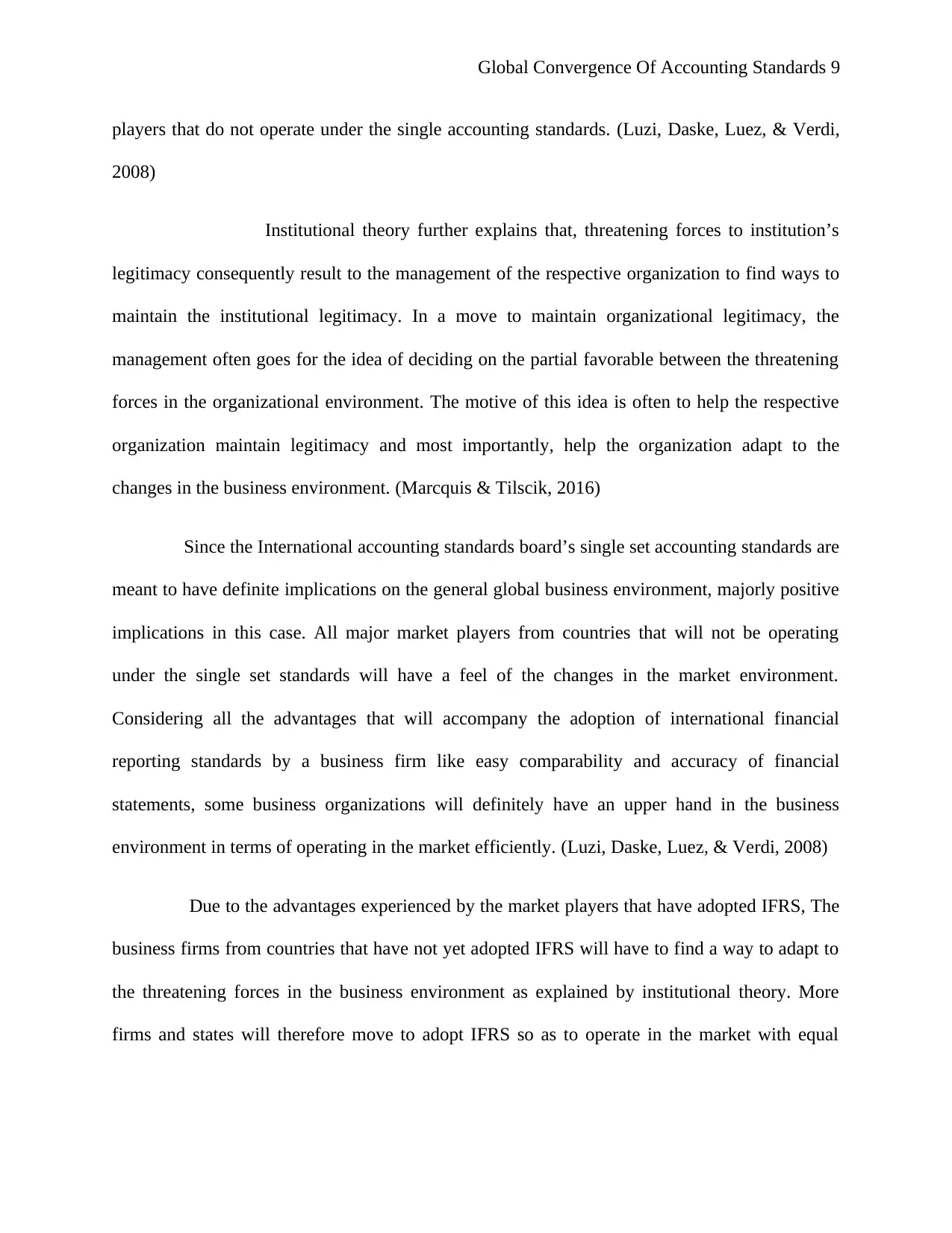
Global Convergence Of Accounting Standards 9
players that do not operate under the single accounting standards. (Luzi, Daske, Luez, & Verdi,
2008)
Institutional theory further explains that, threatening forces to institution’s
legitimacy consequently result to the management of the respective organization to find ways to
maintain the institutional legitimacy. In a move to maintain organizational legitimacy, the
management often goes for the idea of deciding on the partial favorable between the threatening
forces in the organizational environment. The motive of this idea is often to help the respective
organization maintain legitimacy and most importantly, help the organization adapt to the
changes in the business environment. (Marcquis & Tilscik, 2016)
Since the International accounting standards board’s single set accounting standards are
meant to have definite implications on the general global business environment, majorly positive
implications in this case. All major market players from countries that will not be operating
under the single set standards will have a feel of the changes in the market environment.
Considering all the advantages that will accompany the adoption of international financial
reporting standards by a business firm like easy comparability and accuracy of financial
statements, some business organizations will definitely have an upper hand in the business
environment in terms of operating in the market efficiently. (Luzi, Daske, Luez, & Verdi, 2008)
Due to the advantages experienced by the market players that have adopted IFRS, The
business firms from countries that have not yet adopted IFRS will have to find a way to adapt to
the threatening forces in the business environment as explained by institutional theory. More
firms and states will therefore move to adopt IFRS so as to operate in the market with equal
players that do not operate under the single accounting standards. (Luzi, Daske, Luez, & Verdi,
2008)
Institutional theory further explains that, threatening forces to institution’s
legitimacy consequently result to the management of the respective organization to find ways to
maintain the institutional legitimacy. In a move to maintain organizational legitimacy, the
management often goes for the idea of deciding on the partial favorable between the threatening
forces in the organizational environment. The motive of this idea is often to help the respective
organization maintain legitimacy and most importantly, help the organization adapt to the
changes in the business environment. (Marcquis & Tilscik, 2016)
Since the International accounting standards board’s single set accounting standards are
meant to have definite implications on the general global business environment, majorly positive
implications in this case. All major market players from countries that will not be operating
under the single set standards will have a feel of the changes in the market environment.
Considering all the advantages that will accompany the adoption of international financial
reporting standards by a business firm like easy comparability and accuracy of financial
statements, some business organizations will definitely have an upper hand in the business
environment in terms of operating in the market efficiently. (Luzi, Daske, Luez, & Verdi, 2008)
Due to the advantages experienced by the market players that have adopted IFRS, The
business firms from countries that have not yet adopted IFRS will have to find a way to adapt to
the threatening forces in the business environment as explained by institutional theory. More
firms and states will therefore move to adopt IFRS so as to operate in the market with equal
⊘ This is a preview!⊘
Do you want full access?
Subscribe today to unlock all pages.

Trusted by 1+ million students worldwide
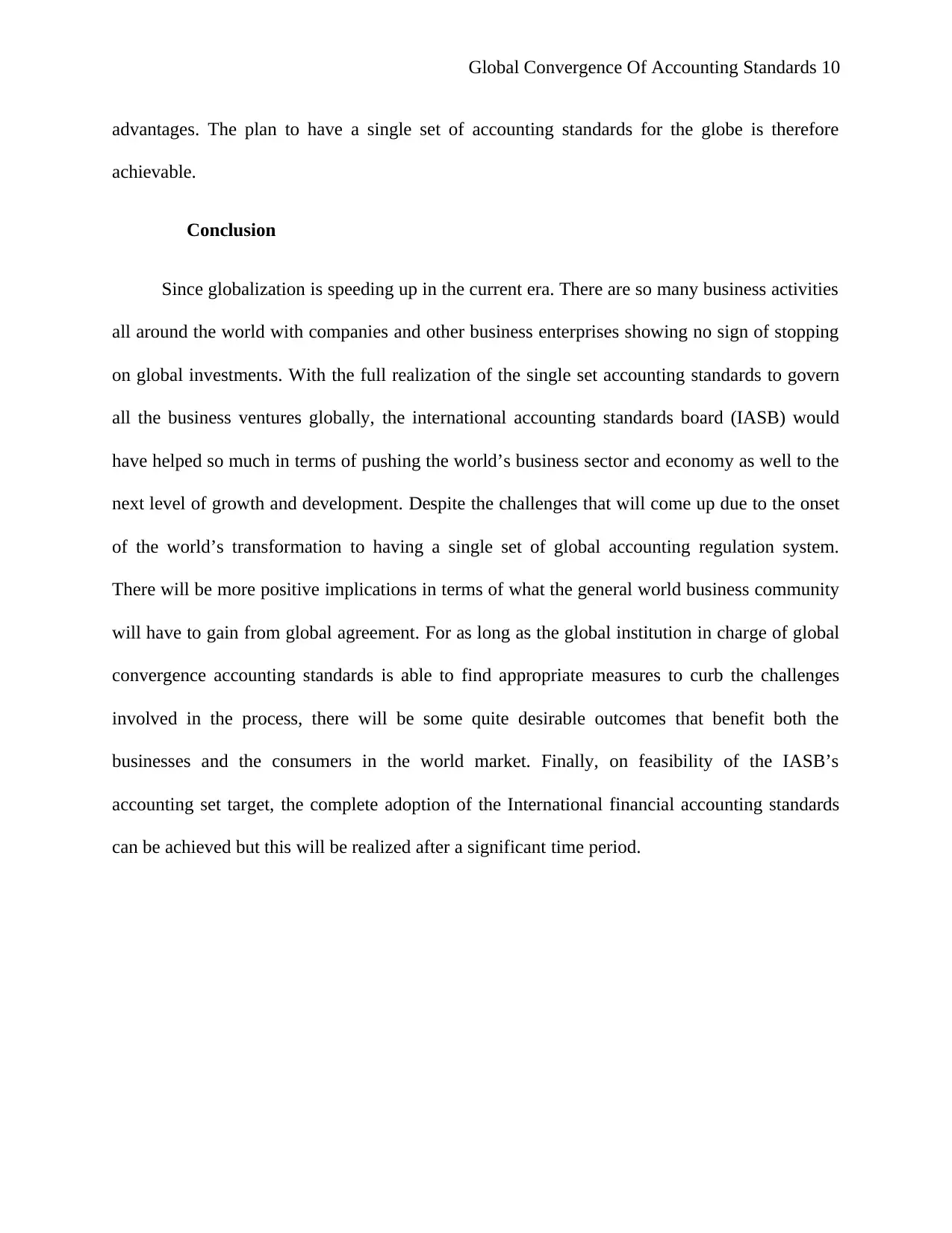
Global Convergence Of Accounting Standards 10
advantages. The plan to have a single set of accounting standards for the globe is therefore
achievable.
Conclusion
Since globalization is speeding up in the current era. There are so many business activities
all around the world with companies and other business enterprises showing no sign of stopping
on global investments. With the full realization of the single set accounting standards to govern
all the business ventures globally, the international accounting standards board (IASB) would
have helped so much in terms of pushing the world’s business sector and economy as well to the
next level of growth and development. Despite the challenges that will come up due to the onset
of the world’s transformation to having a single set of global accounting regulation system.
There will be more positive implications in terms of what the general world business community
will have to gain from global agreement. For as long as the global institution in charge of global
convergence accounting standards is able to find appropriate measures to curb the challenges
involved in the process, there will be some quite desirable outcomes that benefit both the
businesses and the consumers in the world market. Finally, on feasibility of the IASB’s
accounting set target, the complete adoption of the International financial accounting standards
can be achieved but this will be realized after a significant time period.
advantages. The plan to have a single set of accounting standards for the globe is therefore
achievable.
Conclusion
Since globalization is speeding up in the current era. There are so many business activities
all around the world with companies and other business enterprises showing no sign of stopping
on global investments. With the full realization of the single set accounting standards to govern
all the business ventures globally, the international accounting standards board (IASB) would
have helped so much in terms of pushing the world’s business sector and economy as well to the
next level of growth and development. Despite the challenges that will come up due to the onset
of the world’s transformation to having a single set of global accounting regulation system.
There will be more positive implications in terms of what the general world business community
will have to gain from global agreement. For as long as the global institution in charge of global
convergence accounting standards is able to find appropriate measures to curb the challenges
involved in the process, there will be some quite desirable outcomes that benefit both the
businesses and the consumers in the world market. Finally, on feasibility of the IASB’s
accounting set target, the complete adoption of the International financial accounting standards
can be achieved but this will be realized after a significant time period.
Paraphrase This Document
Need a fresh take? Get an instant paraphrase of this document with our AI Paraphraser
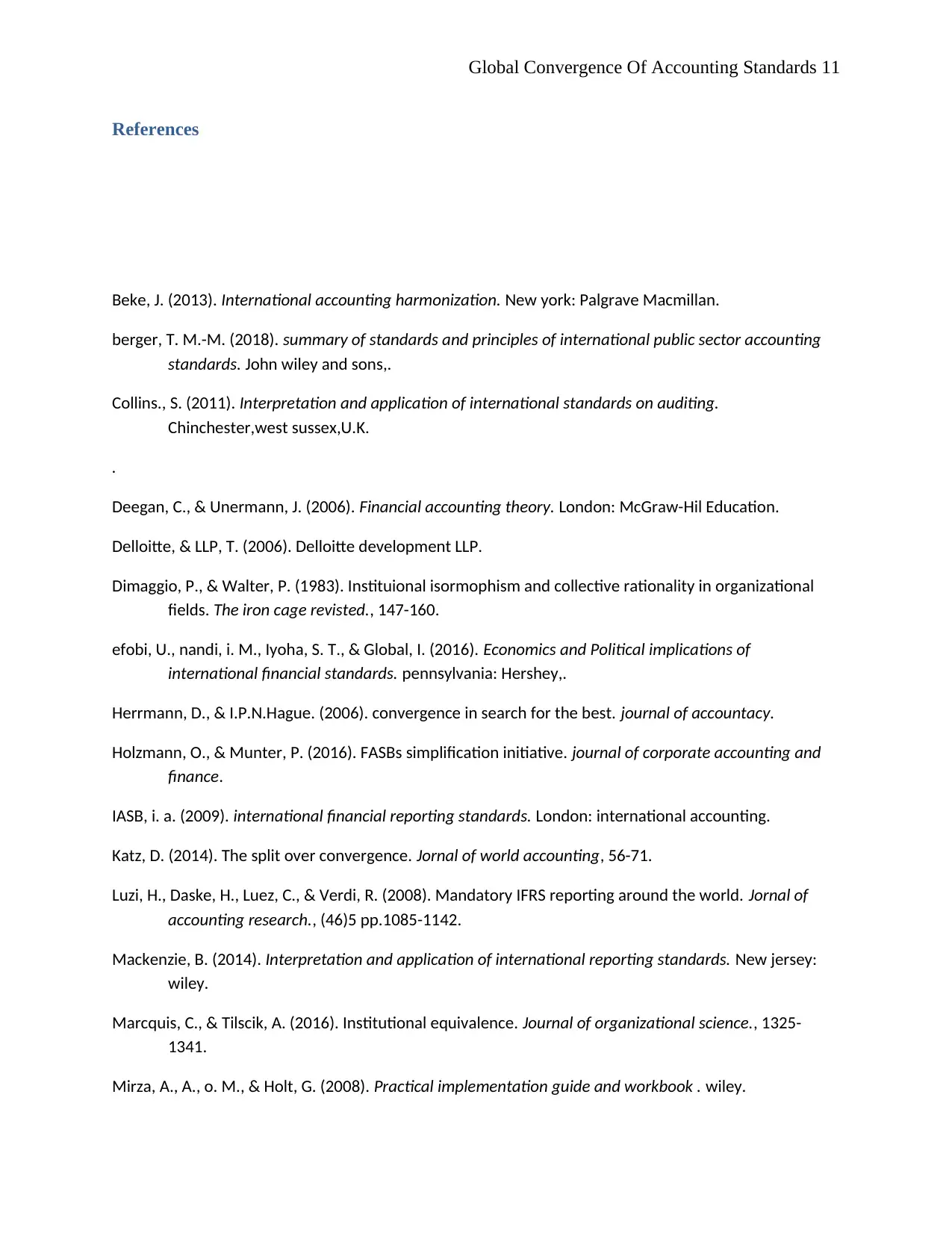
Global Convergence Of Accounting Standards 11
References
Beke, J. (2013). International accounting harmonization. New york: Palgrave Macmillan.
berger, T. M.-M. (2018). summary of standards and principles of international public sector accounting
standards. John wiley and sons,.
Collins., S. (2011). Interpretation and application of international standards on auditing.
Chinchester,west sussex,U.K.
.
Deegan, C., & Unermann, J. (2006). Financial accounting theory. London: McGraw-Hil Education.
Delloitte, & LLP, T. (2006). Delloitte development LLP.
Dimaggio, P., & Walter, P. (1983). Instituional isormophism and collective rationality in organizational
fields. The iron cage revisted., 147-160.
efobi, U., nandi, i. M., Iyoha, S. T., & Global, I. (2016). Economics and Political implications of
international financial standards. pennsylvania: Hershey,.
Herrmann, D., & I.P.N.Hague. (2006). convergence in search for the best. journal of accountacy.
Holzmann, O., & Munter, P. (2016). FASBs simplification initiative. journal of corporate accounting and
finance.
IASB, i. a. (2009). international financial reporting standards. London: international accounting.
Katz, D. (2014). The split over convergence. Jornal of world accounting, 56-71.
Luzi, H., Daske, H., Luez, C., & Verdi, R. (2008). Mandatory IFRS reporting around the world. Jornal of
accounting research., (46)5 pp.1085-1142.
Mackenzie, B. (2014). Interpretation and application of international reporting standards. New jersey:
wiley.
Marcquis, C., & Tilscik, A. (2016). Institutional equivalence. Journal of organizational science., 1325-
1341.
Mirza, A., A., o. M., & Holt, G. (2008). Practical implementation guide and workbook . wiley.
References
Beke, J. (2013). International accounting harmonization. New york: Palgrave Macmillan.
berger, T. M.-M. (2018). summary of standards and principles of international public sector accounting
standards. John wiley and sons,.
Collins., S. (2011). Interpretation and application of international standards on auditing.
Chinchester,west sussex,U.K.
.
Deegan, C., & Unermann, J. (2006). Financial accounting theory. London: McGraw-Hil Education.
Delloitte, & LLP, T. (2006). Delloitte development LLP.
Dimaggio, P., & Walter, P. (1983). Instituional isormophism and collective rationality in organizational
fields. The iron cage revisted., 147-160.
efobi, U., nandi, i. M., Iyoha, S. T., & Global, I. (2016). Economics and Political implications of
international financial standards. pennsylvania: Hershey,.
Herrmann, D., & I.P.N.Hague. (2006). convergence in search for the best. journal of accountacy.
Holzmann, O., & Munter, P. (2016). FASBs simplification initiative. journal of corporate accounting and
finance.
IASB, i. a. (2009). international financial reporting standards. London: international accounting.
Katz, D. (2014). The split over convergence. Jornal of world accounting, 56-71.
Luzi, H., Daske, H., Luez, C., & Verdi, R. (2008). Mandatory IFRS reporting around the world. Jornal of
accounting research., (46)5 pp.1085-1142.
Mackenzie, B. (2014). Interpretation and application of international reporting standards. New jersey:
wiley.
Marcquis, C., & Tilscik, A. (2016). Institutional equivalence. Journal of organizational science., 1325-
1341.
Mirza, A., A., o. M., & Holt, G. (2008). Practical implementation guide and workbook . wiley.
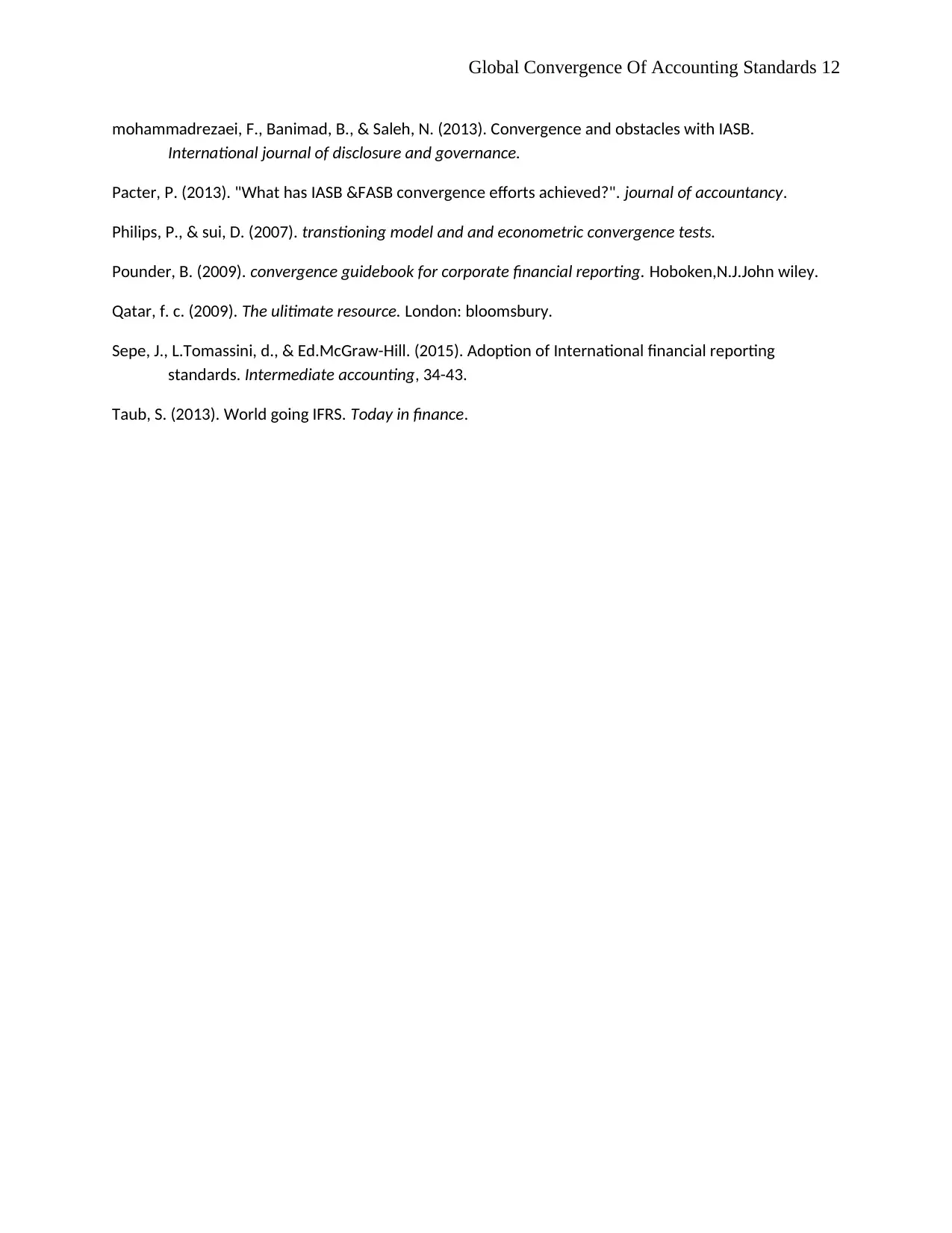
Global Convergence Of Accounting Standards 12
mohammadrezaei, F., Banimad, B., & Saleh, N. (2013). Convergence and obstacles with IASB.
International journal of disclosure and governance.
Pacter, P. (2013). "What has IASB &FASB convergence efforts achieved?". journal of accountancy.
Philips, P., & sui, D. (2007). transtioning model and and econometric convergence tests.
Pounder, B. (2009). convergence guidebook for corporate financial reporting. Hoboken,N.J.John wiley.
Qatar, f. c. (2009). The ulitimate resource. London: bloomsbury.
Sepe, J., L.Tomassini, d., & Ed.McGraw-Hill. (2015). Adoption of International financial reporting
standards. Intermediate accounting, 34-43.
Taub, S. (2013). World going IFRS. Today in finance.
mohammadrezaei, F., Banimad, B., & Saleh, N. (2013). Convergence and obstacles with IASB.
International journal of disclosure and governance.
Pacter, P. (2013). "What has IASB &FASB convergence efforts achieved?". journal of accountancy.
Philips, P., & sui, D. (2007). transtioning model and and econometric convergence tests.
Pounder, B. (2009). convergence guidebook for corporate financial reporting. Hoboken,N.J.John wiley.
Qatar, f. c. (2009). The ulitimate resource. London: bloomsbury.
Sepe, J., L.Tomassini, d., & Ed.McGraw-Hill. (2015). Adoption of International financial reporting
standards. Intermediate accounting, 34-43.
Taub, S. (2013). World going IFRS. Today in finance.
⊘ This is a preview!⊘
Do you want full access?
Subscribe today to unlock all pages.

Trusted by 1+ million students worldwide
1 out of 12
Related Documents
Your All-in-One AI-Powered Toolkit for Academic Success.
+13062052269
info@desklib.com
Available 24*7 on WhatsApp / Email
![[object Object]](/_next/static/media/star-bottom.7253800d.svg)
Unlock your academic potential
Copyright © 2020–2025 A2Z Services. All Rights Reserved. Developed and managed by ZUCOL.



